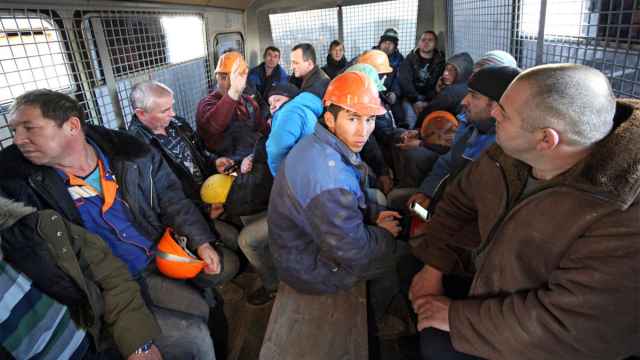День Радио: Radio Day
Russians are great quoters. They learn poems by heart in childhood. At the drop of a hat, they can sing at least a hundred folk songs together, in three-part harmony. They quote bits of plays at you, or famous lines from novels. And they are likely to inject lines from movies into conversations when real life reminds them of a celluloid version.
This is rough on foreigners learning the language. At first you have no idea what’s original and what’s a quote. You spend a lot of time laughing like you get the joke when you don’t.
That’s the bad news. The good news is that you get to justify watching a lot of movies in the name of education.
There are plenty of Soviet films that people watch and rewatch so many times that they can recite most of them by heart. Among more recent films that have produced a great deal for the national storehouse of quotes and jokes is День Радио (Radio Day). The film is also a great snapshot of the Russian language at the turn of this century. And it is very, very funny.
День Радио was first a stage production that debuted in 2001. Then it was filmed for television and finally made into a film in 2008. It was written by and stars the members of theater group Квартет И (Quartet I), who graduated from theater school in 1993 have continued to work together ever since.
The action of the film takes place in a Moscow radio station, and the time it takes place in is the height of the как бы language phase. For a while, everything in Russian happened как бы (like, kinda, sort of). People didn’t make phone calls. Они как бы звонили. (They, like, called.) We didn’t go to the cinema. Мы как бы пошли в кино. (We, like, went to the movies.) People didn’t want to do something. Они как бы хотят устроиться там на работу и как бы не очень (They kinda want to get a job there and they kinda are like, not so much.) For about a decade, we lived in a sea of indefinite, vague, almost-ness.
In the movie, the name of the radio station is Как бы радио (kinda like radio). Уже смешно. (Hilarious.) The DJs say Добрый вечер, мои любимые как бы радиослушатели. (Good evening my favorite, like, radio audience.) They talk about their как бы лучшее радио (the best, like, radio station). A guest shouts at them, “У вас на как бы радио вы вообще, что ли, как бы охренели?” (At your, like, radio station, have you all, like, lost your frigging minds?) By the end of the film, you’ll be sticking как бы into everything you say, too.
When the movie begins, the evening shift is coming on, and after the DJs play tricks on each other on air, they learn that the marathon they are about to begin — to save Russian tourists stuck in the Congo — has been taken up by their competitor, Авторадио (Car Radio). They already have a dozen musical groups on their way to play for the marathon. They need to quickly come up with another issue or problem. The station head asks his secretary, Anya, to gather the staff.
He uses the new imported jargon: Позови креативщиков! (Call in the talent!) Anya is confused. А что, Слава тоже креативщик? Я думала, он нормальный мужик… (So is Slava also talented in that way? I thought he was straight…) And one of the other “talents” has to explain: Аня, запомни, пожалуйста, что слова «креативщик», «саундпродюсер», точно так же, как «гомеопат» или «педиатр», никакого отношения к человеческой ориентации не имеют! (Anya, please try to remember that words like talent and sound producer, just like homeopath and pediatrician, have nothing to do with sexual orientation!)
The talent flips through newspapers and online news, searching for something worthy of a marathon. They find a small Russian boat with a tiny traveling circus stuck in the middle of the Sea of Japan. This is not marathon-worthy until they make up a story about it: it’s a huge liner called Доктор наук профессор Шварценгольд (Professor Ph.D Shvartsengold) — try saying it fast, or at all — that is carrying an entire zoo of rare and endangered animals. Great! Everyone loves endangered animals. Now all they have to do is make up the rare animals that must be saved.
And with that, День Радио enters both film history and the Russian language. The trick with these rare, endangered animals is to make them sound plausible, or rather как бы правдоподобные (kind of plausible). They come up with a long, ridiculous list. I’ll save some for you to discover, but here is a sample:
— семья жидкохвостных павианов (a family of Sparse-Tailed Baboons)
— 2 скунсовидные коровы (two Skunkeous Bovines)
— подкустовый выползень (one Underbrush Crawler)
— редкая разновидность хорька — хорёк-паникёр (больше известный как хорёк-вонючка) (a rare breed of ferret, the Panic Ferret, better known as the Stink Ferret)
— среднеевропейский древесный хохотун (a Central European Forest Hooter)
— североамериканский кролик-зануда (a North American Nitpicking Cottontail)
— рыба-мяч (Ball-Fish)
— целый выводок африканских одноразовых бабочек (an entire brood of African Disposable Butterflies)
— 1 гигантский саблезубый кузнечик (one Giant Saber-Toothed Grasshopper)
— медведь-летун (a Flying Bear)
Chaos ensues and all our suspicions about life in a radio station are confirmed. Everyone seems to be sleeping with everyone else; the musicians are unpaid and have no idea or particular interest in the topic of the marathon; the chief technician drinks on the job; the DJs fake phone calls to celebrities (Bridget Bardot); the electricity goes off and the musicians get stuck in the elevator; and when they need a “specialist,” they pull in the drunk techie, who pours vodka for the DJs and makes up fake stories about the fake animals on the fake liner.
The DJ asks: Сколько раз за день кролики могут... спариваться? (How many times a day can that Cottontail, er, mate?) The “professor” answers: За день-то? Бог с вами. Раз в полгода! (In a day? Good heavens, man. Once every six months!) He pours a round and continues: И что самое страшное, что после этого спаривания самец умирает! Ну, как умирает. Он впадает в эйфорию и вываливается из гнезда. Либо сразу ломает себе шею, либо его съедают.... (And the worst thing is that after that mating the male dies! Well, how he dies is this: He becomes euphoric and falls out of the nest. Either he immediately breaks his neck or gets eaten.)
The film cuts between the studio and the boat, where the two-person crew and two-person circus have no idea that they are the talk of Moscow.
Somehow it all ends well in the studio, and then students of Russian get a lesson in Russian As It Is Spoke. On the boat, which has somehow been fixed, the four human passengers stand at the helm. Nina, once overcome by seasickness, seems to have been cured — как бы — by the first mate. The captain wants to know how he fixed the motor.
Что ты с ним сделал? (What did you do to it?) The first mate replies, with a glance at Nina: А чёрт его знает. Ну как-то всё между собой… а значит это… за это самое… она и заработала… Решил не трогать. Зачем трогать, раз работает? (Damned if I know. Well, it all kinda came together… and then… the thing kinda… well, it started up. I decided not to touch it. Why touch it when it works?”)
The captain looks ahead toward the horizon: Потому что это жизнь. Её хрен поймёшь. Особенно в море. (Because that’s life. It’s a friggin’ mystery. Especially at sea.)
And with that — the motor conks out and the film ends.
Watch it. Or watch it again. Laughter guaranteed.






